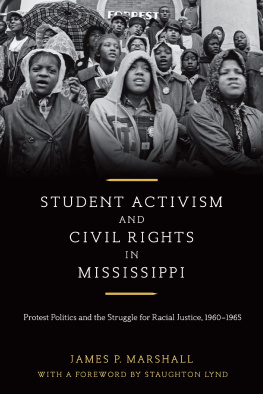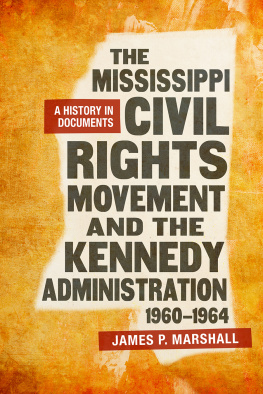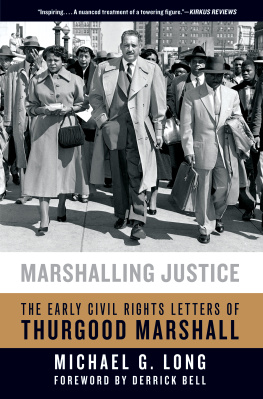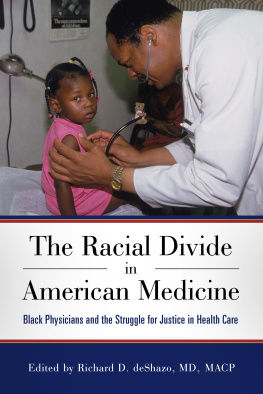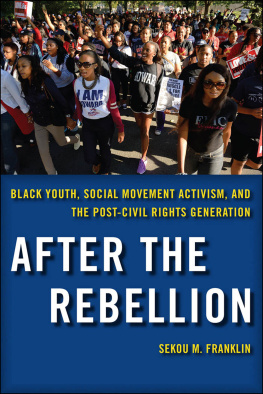James P. Marshall - Student Activism and Civil Rights in Mississippi: Protest Politics and the Struggle for Racial Justice, 1960-1965
Here you can read online James P. Marshall - Student Activism and Civil Rights in Mississippi: Protest Politics and the Struggle for Racial Justice, 1960-1965 full text of the book (entire story) in english for free. Download pdf and epub, get meaning, cover and reviews about this ebook. year: 2013, publisher: LSU Press, genre: Politics. Description of the work, (preface) as well as reviews are available. Best literature library LitArk.com created for fans of good reading and offers a wide selection of genres:
Romance novel
Science fiction
Adventure
Detective
Science
History
Home and family
Prose
Art
Politics
Computer
Non-fiction
Religion
Business
Children
Humor
Choose a favorite category and find really read worthwhile books. Enjoy immersion in the world of imagination, feel the emotions of the characters or learn something new for yourself, make an fascinating discovery.
- Book:Student Activism and Civil Rights in Mississippi: Protest Politics and the Struggle for Racial Justice, 1960-1965
- Author:
- Publisher:LSU Press
- Genre:
- Year:2013
- Rating:4 / 5
- Favourites:Add to favourites
- Your mark:
- 80
- 1
- 2
- 3
- 4
- 5
Student Activism and Civil Rights in Mississippi: Protest Politics and the Struggle for Racial Justice, 1960-1965: summary, description and annotation
We offer to read an annotation, description, summary or preface (depends on what the author of the book "Student Activism and Civil Rights in Mississippi: Protest Politics and the Struggle for Racial Justice, 1960-1965" wrote himself). If you haven't found the necessary information about the book — write in the comments, we will try to find it.
James P. Marshall: author's other books
Who wrote Student Activism and Civil Rights in Mississippi: Protest Politics and the Struggle for Racial Justice, 1960-1965? Find out the surname, the name of the author of the book and a list of all author's works by series.
Student Activism and Civil Rights in Mississippi: Protest Politics and the Struggle for Racial Justice, 1960-1965 — read online for free the complete book (whole text) full work
Below is the text of the book, divided by pages. System saving the place of the last page read, allows you to conveniently read the book "Student Activism and Civil Rights in Mississippi: Protest Politics and the Struggle for Racial Justice, 1960-1965" online for free, without having to search again every time where you left off. Put a bookmark, and you can go to the page where you finished reading at any time.
Font size:
Interval:
Bookmark:
AND
CIVIL RIGHTS
IN
MISSISSIPPI

Copyright 2013 by Louisiana State University Press
All rights reserved
Manufactured in the United States of America
First printing
TYPEFACE: Chaparral Pro
PRINTER: McNaughton & Gunn, Inc.
BINDER: Dekker Bookbinding
MAPS: Mary Lee Eggert
Student activism and civil rights in Mississippi : protest politics and the struggle for racial justice, 19601965 / James P. Marshall ; with a foreword by Staughton Lynd.
p. cm.
Includes bibliographical references and index.
ISBN 978-0-8071-4984-3 (cloth : alk. paper) ISBN 978-0-8071-4985-0 (pdf) ISBN 9780-8071-4986-7 (epub) ISBN 978-0-8071-4987-4 (mobi) 1. Civil rights movementsMississippiHistory20th century. 2. Student movementsMississippiHistory20th century. 3. African AmericansMississippiPolitics and government20th century. 4. College studentsPolitical activityMississippiHistory20th century. 5. African American college studentsPolitical activityMississippiHistory20th century. 6. African AmericansCivil rightsMississippiHistory20th century. 7. MississippiPolitics and government195158. Mississippi Freedom Democratic Party. I. Title.
E185.93.M6M27 2013
323.1196'0730762dc23

of the Mississippi movement who gave their lives
to win freedom from racist oppression
to live believing that Justice Must Be Done
would never have come to fruition
There is a town in Mississippi called Liberty
There is a department in Washington called Justice
(Sign posted at many civil rights offices)
Font size:
Interval:
Bookmark:
Similar books «Student Activism and Civil Rights in Mississippi: Protest Politics and the Struggle for Racial Justice, 1960-1965»
Look at similar books to Student Activism and Civil Rights in Mississippi: Protest Politics and the Struggle for Racial Justice, 1960-1965. We have selected literature similar in name and meaning in the hope of providing readers with more options to find new, interesting, not yet read works.
Discussion, reviews of the book Student Activism and Civil Rights in Mississippi: Protest Politics and the Struggle for Racial Justice, 1960-1965 and just readers' own opinions. Leave your comments, write what you think about the work, its meaning or the main characters. Specify what exactly you liked and what you didn't like, and why you think so.

